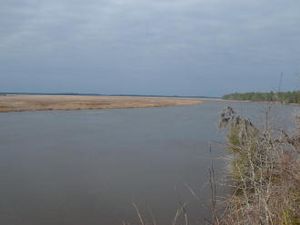Combahee River facts for kids

The Combahee River is a short river in the southern part of South Carolina. It's known as a "blackwater river" because its water looks dark, like tea. This happens when plants decay and release natural dyes into the water.
The Combahee River starts where two other rivers, the Salkehatchie and Little Salkehatchie, meet. This is near a place called Islandton in Colleton County. The river then flows into Saint Helena Sound, which eventually connects to the Atlantic Ocean. The Combahee River is also part of a special area called the ACE Basin, which is important for wildlife.
Contents
History of the Combahee River
The Combahee River gets its name from the Native American tribe who lived there first, the Combahee people. Europeans started settling in this area as early as the 1680s. The Combahee tribe and other local groups were sometimes called "Settlement Indians" because they lived near these new settlements.
Early Conflicts and Wars
Land was set aside for the Yamasee people along several rivers, including the Combahee. From 1715 to 1717, there was a conflict called the Yamasee War. Some small fights happened in the Combahee River area during this time.
The American Revolution and John Laurens
On August 27, 1782, one of the very last battles of the Revolutionary War happened along the Combahee River. British soldiers were trying to find food and supplies. American troops, led by General Gist and Colonel John Laurens, stopped them. Sadly, Colonel Laurens died in this battle. He was the son of Henry Laurens, who used to be the president of the Continental Congress.
The Civil War and Harriet Tubman's Raid
Before the Civil War, the Combahee River was very important. It provided water for some of the biggest rice farms in the area. These farms relied on the river for growing rice.
During the Civil War, a very important event happened here. It was called the Raid on Combahee Ferry. On June 2, 1863, Union soldiers launched a raid deep into South Carolina. This raid freed over 750 enslaved people.
This amazing effort was led by Harriet Tubman. She was an escaped slave herself and was famous for guiding hundreds of others to freedom on the Underground Railroad. The bridge across the Combahee River on US Highway 17 is near where this historic raid took place.
Cultural Legacy of the Combahee
The Combahee River has also inspired important groups. The Combahee River Collective was a group of Black feminist women. They formed in 1974 and named themselves after Harriet Tubman's raid. They wanted to honor the bravery and freedom that happened there.
The Combahee River Collective Statement
The Collective was very important because they showed that the main feminist movement at the time was not fully addressing the special needs of Black women. They are best known for writing the Combahee River Collective Statement. This document is a key part of Black feminist history. It helped develop ideas about "identity" that are still used by activists and thinkers today.
See also
 In Spanish: Río Combahee para niños
In Spanish: Río Combahee para niños

